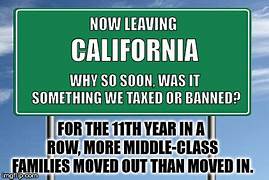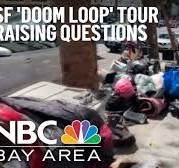How do you end democracy in your community? Easy. Have your city council wait till the middle of the night to hold serious discussions. While decent people have kids to take care of, jobs to go to, so they need their sleep. Nowt in Santa Monica or other radical communities.
- “Here’s a new rule to improve California’s local democracy. When your local bars close, so must your city council.
The idea occurred while watching recent Santa Monica City Council meetings, gatherings so long (one recently went 10½ hours) and so nonsensical that they could make you reconsider your support for free speech and self-government.
The bars had shut at 2 a.m., but the council was still going at 3:30 a.m. one October night when it logged its latest late-night crime against democracy: canceling plans to organize a representative assembly of residents to decide the airport’s future. The vote came after hours of public testimony from residents spewing misinformation about developers, ballot measures and interest groups that could only make sense at such an hour.”
Maybe we need a city by city ballot measure—no council meeting can go past, say, 11:00pm. What do you think?
JOE MATHEWS: Go to bed, City Council
- By JOE MATHEWS, Bakersfield Californian, 11/19/23 https://www.bakersfield.com/opinion/joe-mathews-go-to-bed-city-council/article_ff643fc2-858d-11ee-809c-6b6193522aa1.html
- Here’s a new rule to improve California’s local democracy. When your local bars close, so must your city council.
The idea occurred while watching recent Santa Monica City Council meetings, gatherings so long (one recently went 10½ hours) and so nonsensical that they could make you reconsider your support for free speech and self-government.
The bars had shut at 2 a.m., but the council was still going at 3:30 a.m. one October night when it logged its latest late-night crime against democracy: canceling plans to organize a representative assembly of residents to decide the airport’s future. The vote came after hours of public testimony from residents spewing misinformation about developers, ballot measures and interest groups that could only make sense at such an hour.
Alas, this sort of decision-making is to be expected in Santa Monica, which takes perverse pride in endless debate and meeting agendas longer than the U.S. Constitution.
Long, late meetings are also a defect of councils in other California political hothouses — from Huntington Beach to Richmond, where the council recently stayed up past 1 to endorse the Palestinian side in the Israel-Hamas war. Perhaps the late hours explain why such cities are so politically out-there; researchers at UC Berkeley have found that the sleep-deprived brain is more risk-taking and extremist.
But even less politicized cities fall into the long meetings trap when they start sessions in the evening, controversies intrude and council members end up taking votes at hours when they should be in bed.
There are ways to avoid going so late. Many councils start meetings early in the afternoon so that things are done by midevening. Some councils have cut the length of time that residents can speak. A few councils have applied speaking limits to council members themselves.
But when such limits are not enough, councils need curfews. Some have done this successfully. The San Jose City Council established a midnight curfew back in 2017. Other councils require members to agree to extend discussion past 11 p.m.
As a frequent attendee of council meetings, I’d suggest the problem is structural: We mistakenly require council meetings to serve two very different purposes.
First, they are business meetings of a city. Second, they are democratic events where people make their voices heard and perform politics. We’d be better off if we separated those two functions. Cities should have short, formal “business meetings” to make decisions they’re legally required to make. But, before making such decisions, councils should have separate gatherings, both in person and online, devoted to getting real input — and not three-minute rants — from citizens.
The 21st century provides new ways to do this. Local governments around the world use participatory processes that allow citizens not just to weigh in on council decisions, but to set budgets and write laws themselves. Madrid and more than 100 other cities have created online environments in which everyday people can become co-creators of policies.
Santa Monica would benefit from reforms like these, because the city’s longest meetings tend to produce head-scratching decisions. For example, California municipal watchers have long puzzled at Santa Monica’s expensive, years-long, and mostly losing fight against voting rights lawsuits that demanded the city switch from at-large to district elections. Almost all other California cities and school boards have settled such lawsuits cheaply and quickly. When I asked a former official why Santa Monica recklessly fought, he said the city made too many decisions on the litigation late at night.
Former Santa Monica Councilman Bobby Shriver has complained publicly that when he tried to recruit more diverse candidates to serve on the body, they often turned him down, citing the length of the meetings.
“It seems that every meeting of the Santa Monica City Council there’s a debate or controversy caused by how darned long the meetings are,” wrote Damien Newton, the executive director of the Southern California Streets Initiative, which publishes nonprofit news site Santa Monica Next. “The current process makes it difficult or even impossible for normal people to give comments at meetings and the late hours are bad for the council members themselves.”
The fault lies not just with overly talkative politicians but with the public itself. One evening this year, the council cut off public comment on its first agenda item after five hours — ironically, a proposal to regulate overnight noise. But the Santa Monicans attending the meeting refused to go along and instead stuck around to speak on the motion to end public comment. Council members, stymied, gave up and ended the meeting.
The bad news: The council failed to conduct business on an agenda that included an emergency ordinance and, of course, rules for meeting participation.
The good news: The meeting ended before 11 p.m. — early enough for council members to grab a drink on their way home.



